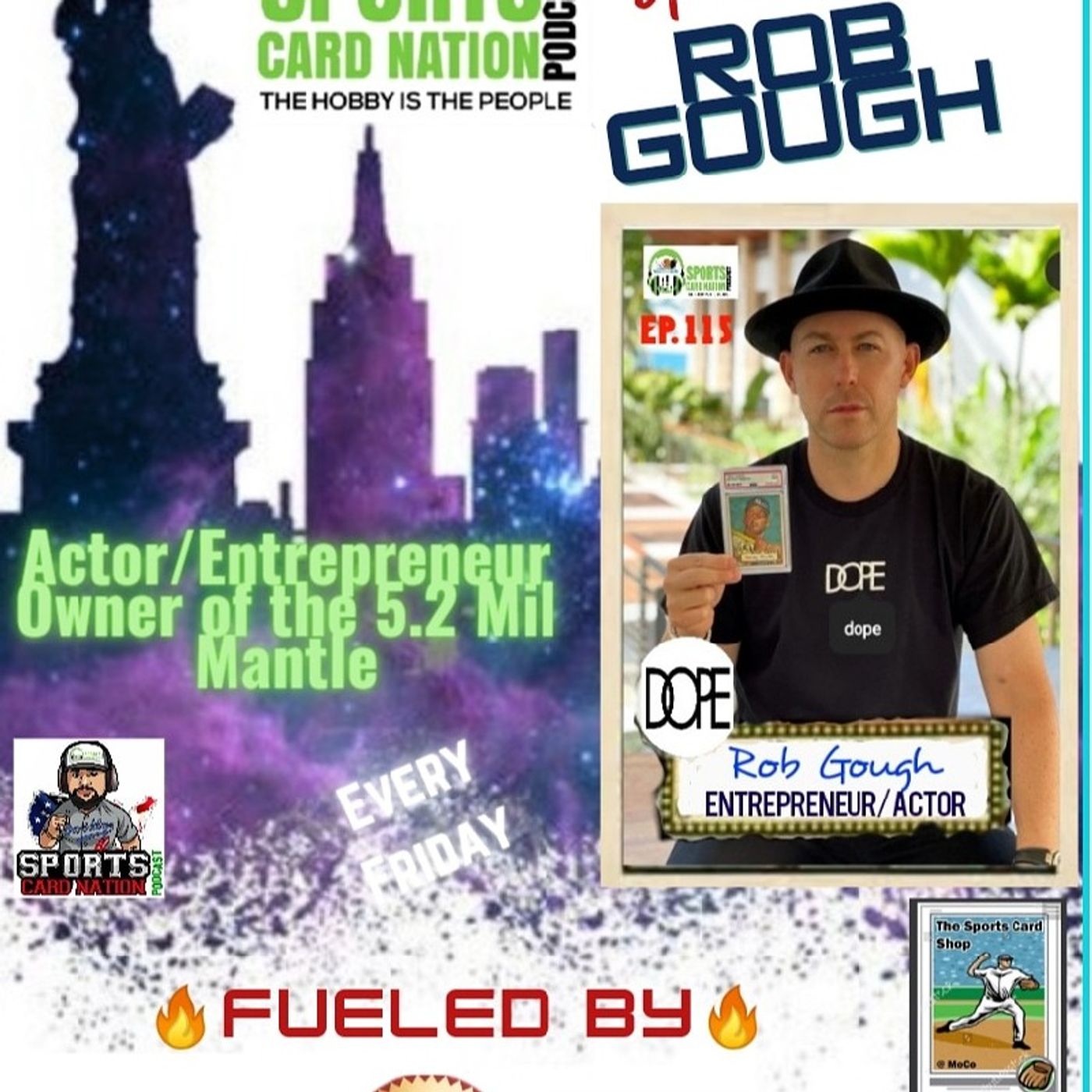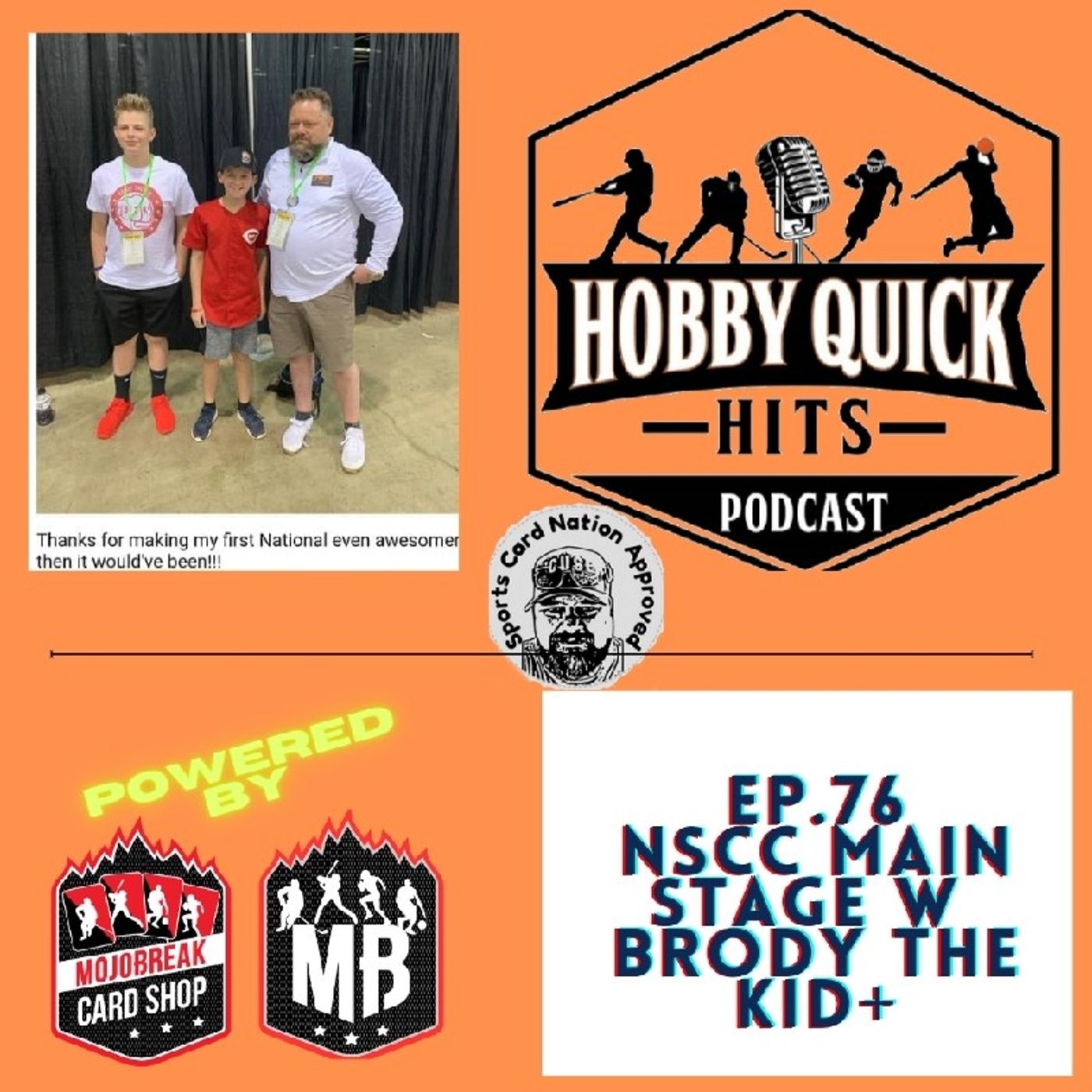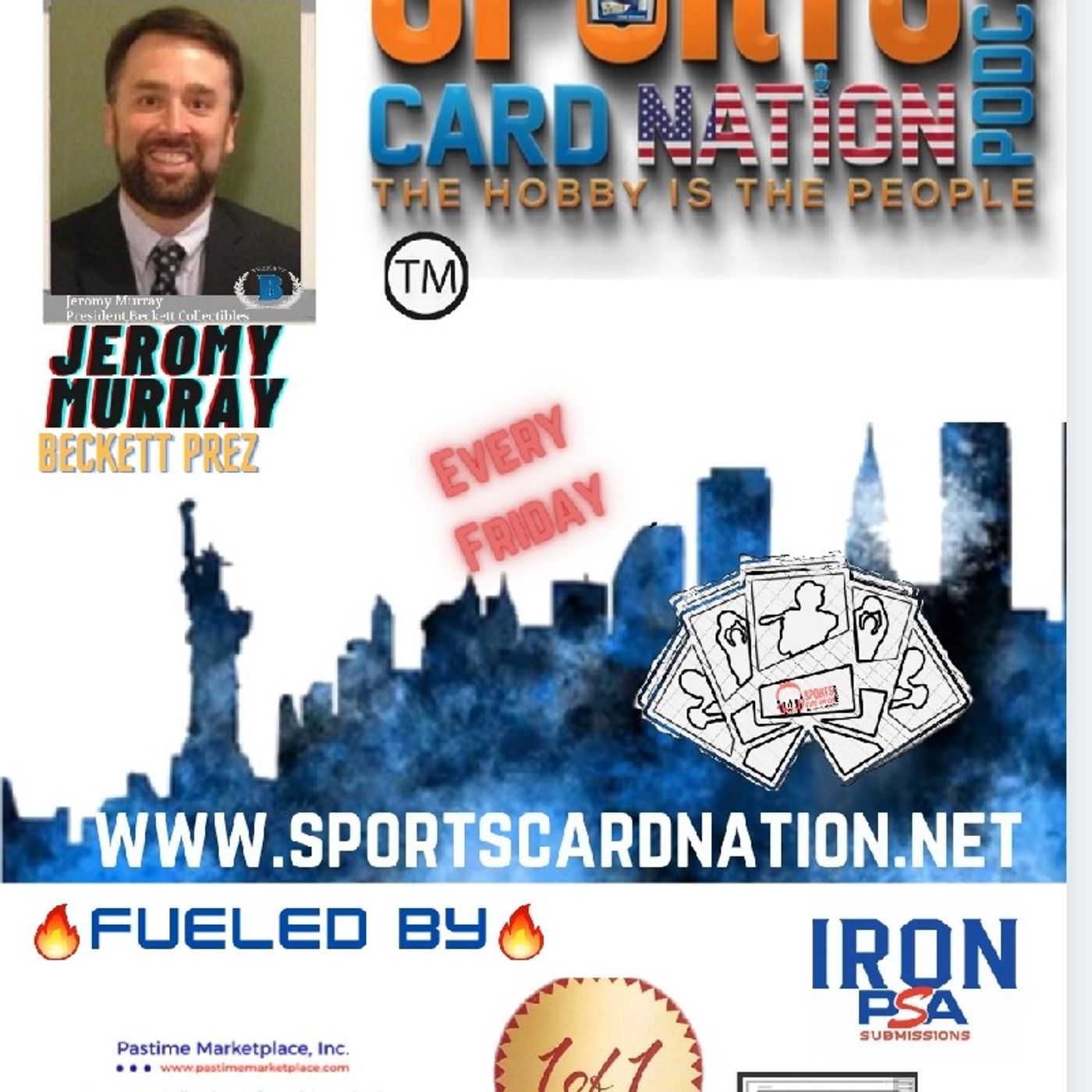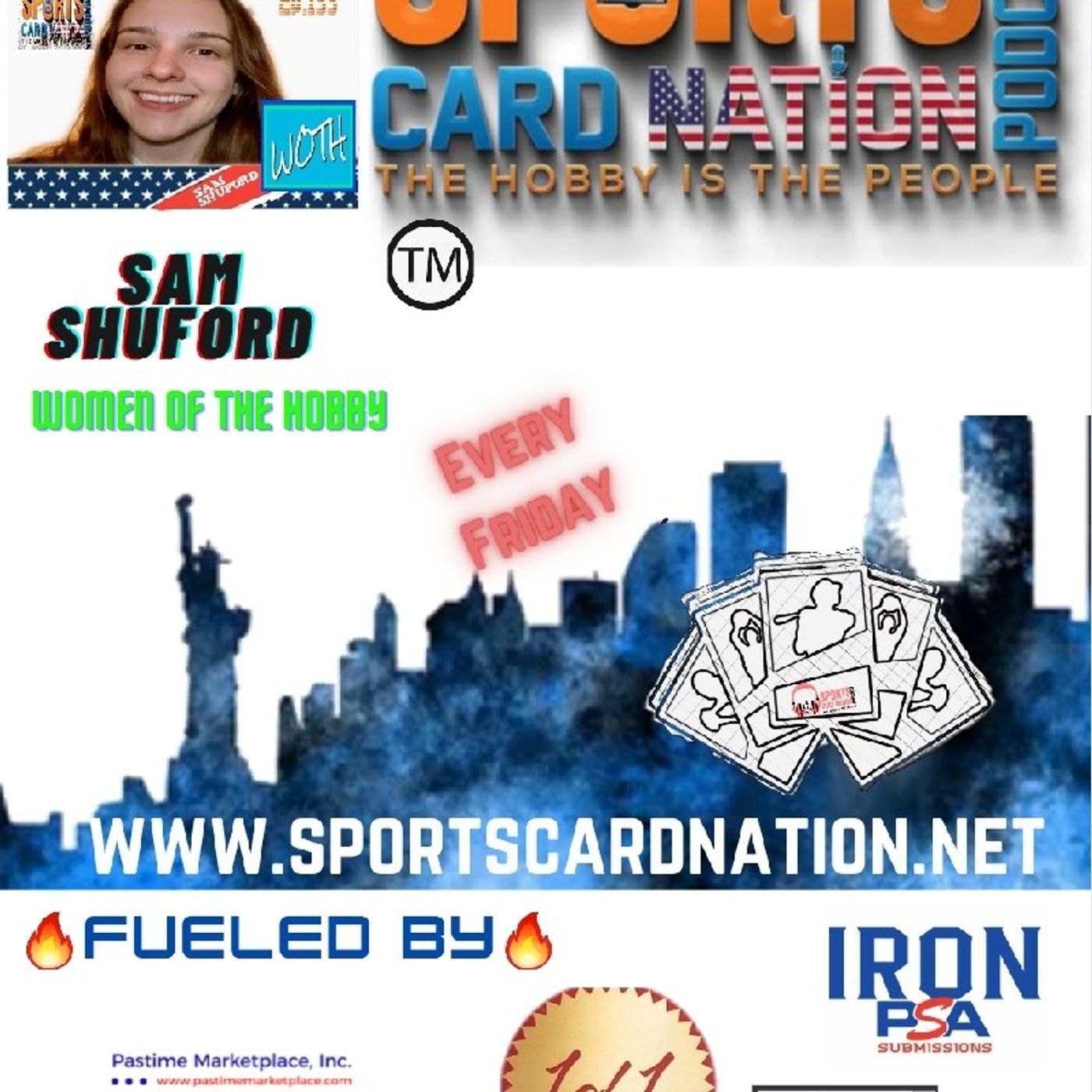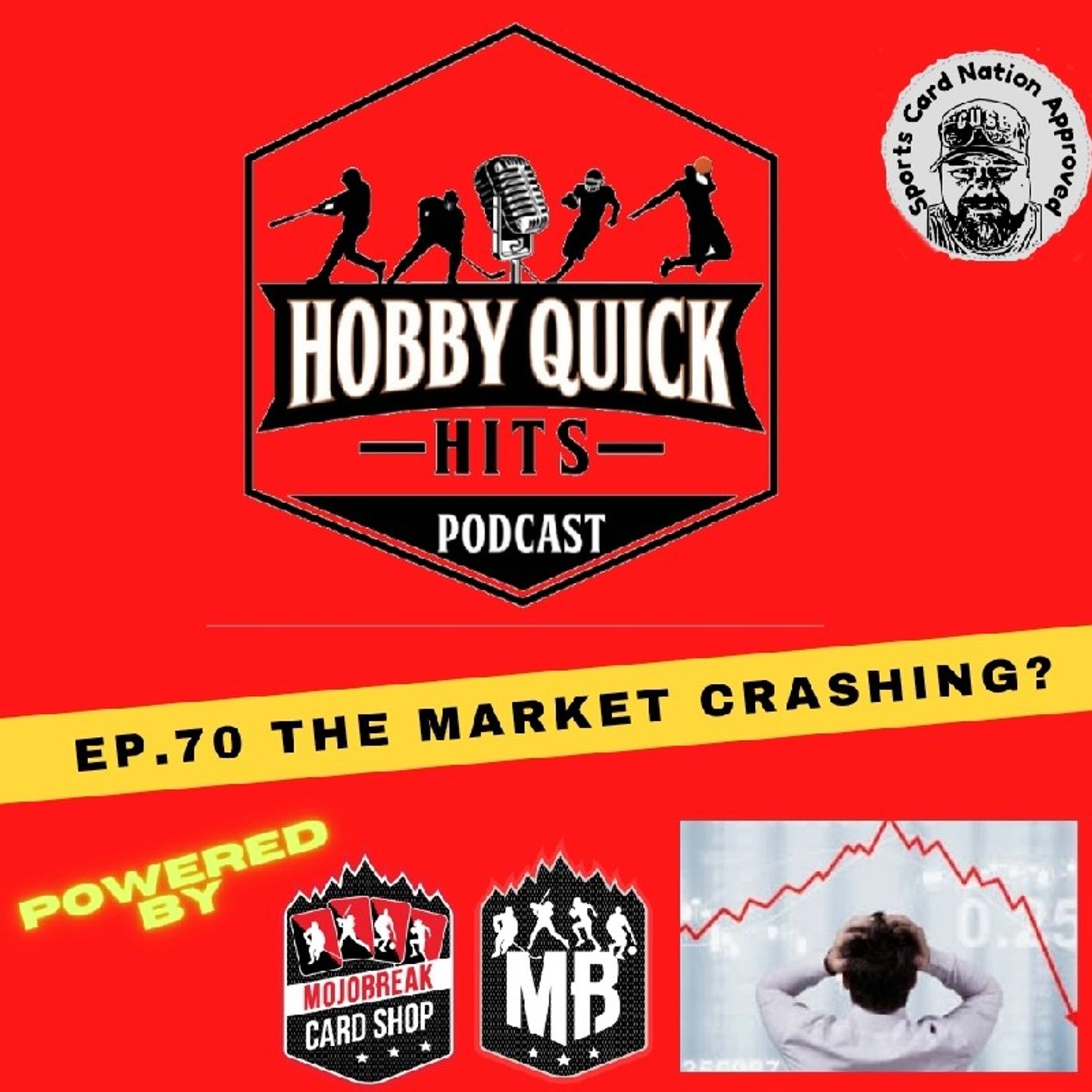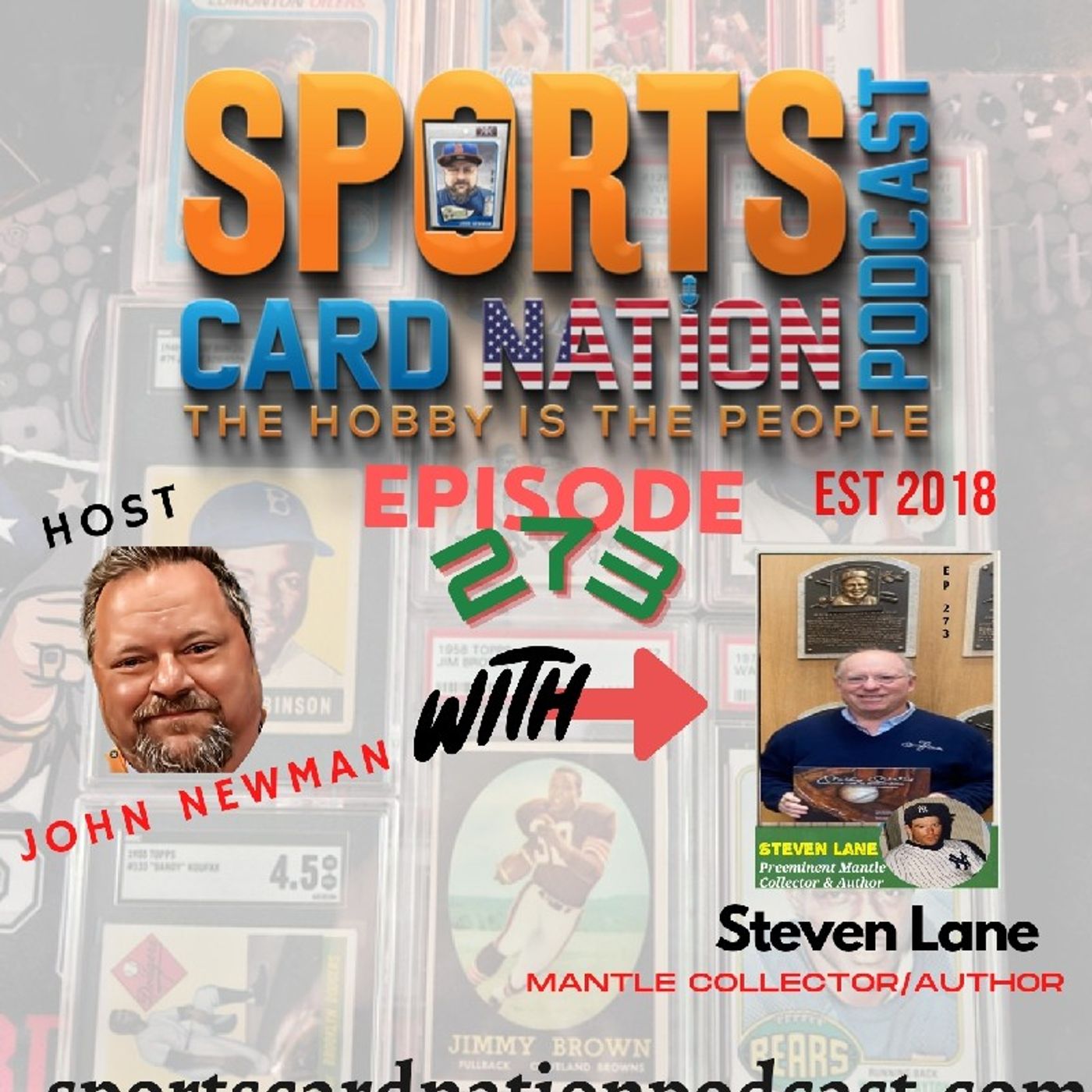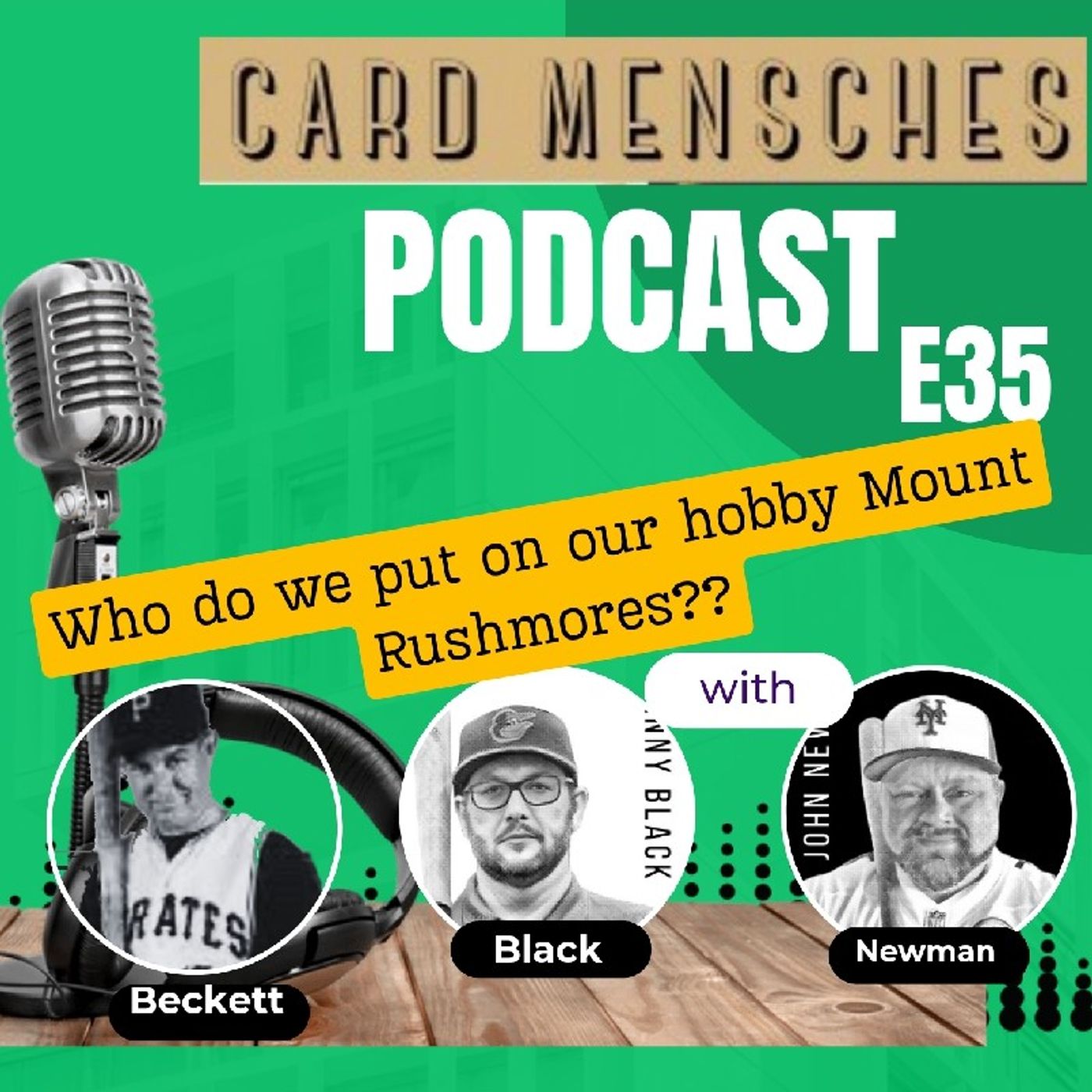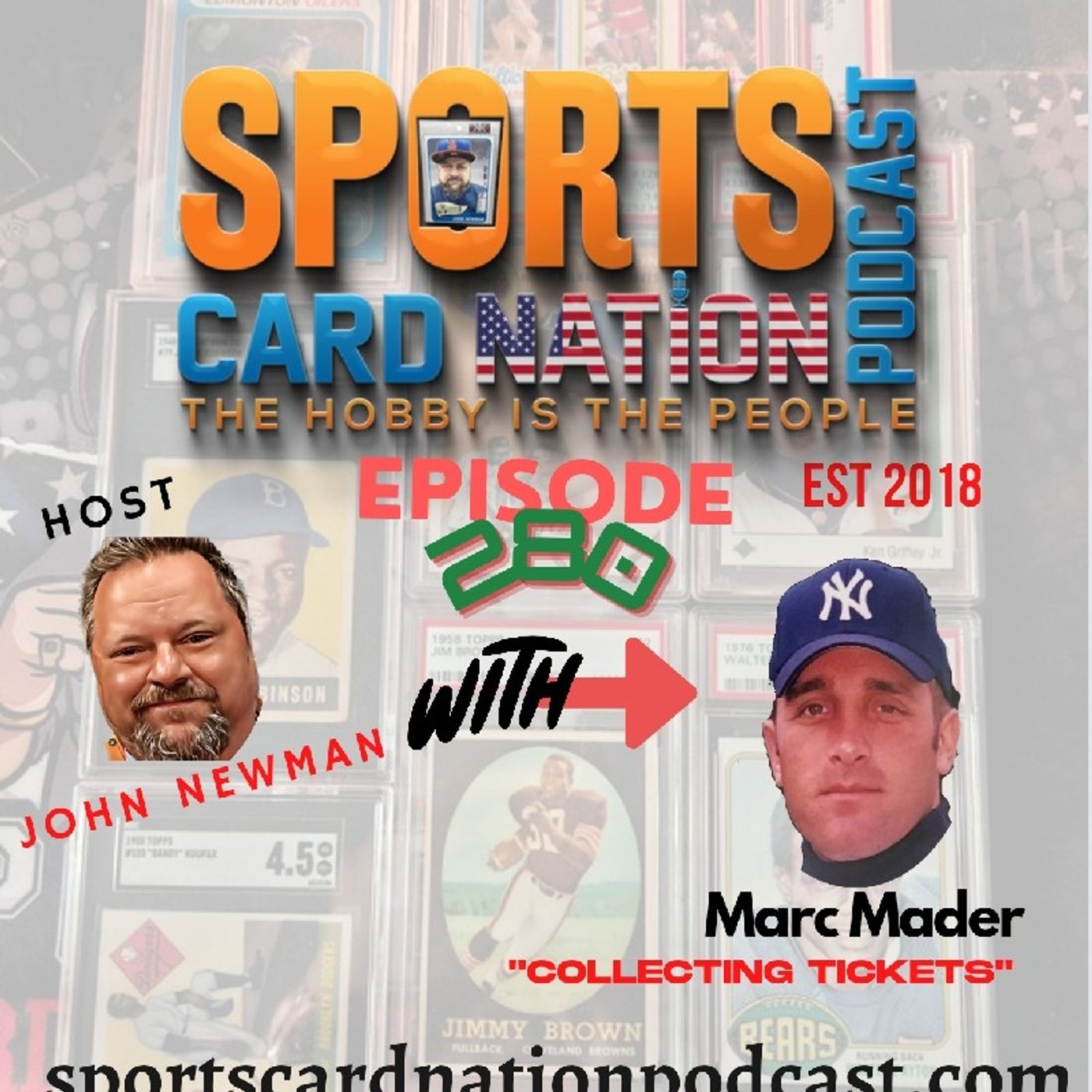Ep,289 w/ Chris Sewall

You could almost call Chris Sewall an "accidental content creator but you should call him "Baseball Collector, Investor, Dealer in that order", he joins us to discuss how it all happened, what he does, enjoys and the hobby.
Follow us on Social...
You could almost call Chris Sewall an "accidental content creator but you should call him "Baseball Collector, Investor, Dealer in that order", he joins us to discuss how it all happened, what he does, enjoys and the hobby.
Follow us on Social Media:
Website:
https://www.sportscardnationpo....com
https://linktr.ee/Sportscardna...
To eliminate pre & post-roll ads
https://www.spreaker.com/podca...
SPEAKER 1: What is up everybody? Episode 289 of Sports Car Nation got a guest. I'm glad to have on, should have had him on sooner and I'll use that line all the time. But, Chris Sewell is my guest today. We talk about really anything hobby. We have similar interests, interests, similar approaches, similar trajectory, in the hobby. And it was a really fun conversation and, went a little over time.
SPEAKER 1: But, we're, we're gonna, you know, we're, we're doing these two part series anyway. So the episode, today's episode is not long. But, we're gonna get a conclusion next week as well. But Chris, great guy doing it the right way if I may be so bold to say and, pleasure, having in mind. We're, listen, we're in the, you know, less, we're in the 30 day, less than 30 days, to the National. Around that time.
SPEAKER 1: We're about a month away. So, get those, you know, all that stuff. You got to button up before Cleveland, get it done where each day we're one day, closer and I'm, I don't know about you, but I'm getting excited. We'll have some announcements to some events that I'll be involved with, here in the coming weeks, as well. So with that being said, let's, let's get this party started.
SPEAKER 2: Iron Sports Cards is your number one source for all your PS A and other grading submissions. Their elite status improves turnaround times. Heck, they even provide the save their chat rooms, provide updates on all your submissions.
SPEAKER 2: They also offer wax options and single cards to cover all the bases. Check them out on Facebook at Iron Sports Cards Group or on the web at Irons Sports cards.com or even give them a call at 1877 Ironps A Rob's got you covered.
SPEAKER 1: All right, excited to have my next guest on the sports card shop guest line. He is a hobby veteran.
SPEAKER 1: Should have had him on sooner but better, late than never. Has a very popular, YouTube channel. And we have some similarities we're gonna talk about but, Chris Sewell, A K A, the baseball card collector investor dealer in that order. Welcome to the show.
SPEAKER 3: Thank you so much for having me on, man. Oh, yeah, you're right. We should have done it earlier.
SPEAKER 1: All right. So, you know, I, I know you've talked about it, on your programming for, but for those that, you know, don't know or, or didn't hear, you know, kind of talk about how you entered the hobby. Like, where did it all start? For you?
SPEAKER 3: So I go, I go all the way back to the late eighties, bought, bought a pack of cards then and fell, fell love with the hobby right away.
SPEAKER 3: I was all in, throughout the nineties crazy collector or full, full time. You know, all I did was collect cards in my spare time. All my friends did as well and then sort of over time they, they started dropping off. I worked at a card store for three years in the late nineties and then sort of did other things for a few, maybe 10 years or so.
SPEAKER 3: And then, around 2010 ish or so, I, I kind of got back in and became a full time dealer and I've been basically a full time dealer since then. So for a little over a decade now and I, I started my channel in, in 2020.
SPEAKER 1: Yeah, that's funny. We have similar trajectories. I'm older so it's almost the same story just 10 years sooner.
SPEAKER 1: For me, what was your first pack? 79 tops. Baseball. It's at seven years old. Pull the Reggie. I'm a New York City kid. Thurman Munson was my guy by that time he was already gone.
SPEAKER 1: But Reggie was a toast in New York City, you know, Mr October and it was that card that really just, I just said, hey, I'm, I'm gonna collect these and get as many as I could and started there like you, I, I started working in the card store around the age of 12. For about 2 to 3 years.
SPEAKER 1: It was supposed to be Chris, it was supposed to be, hey, John, you're here so much. Why don't you just work here? Type of deal? And, and, and the owner of the store named Rudy, he's like, I'll pay you half cash and half store credit. It wound up might as well just be in the whole thing, went back to the stores.
SPEAKER 1: But I didn't really keep the cash and I did that for a few years and then through that, you know, built up a pretty good collection for a young teenage kid and all my friends like you, you know, I have friends who collected and they're like, John, you have the best collection out of us and, and you, you know, you're getting the knowledge from working in the store and I was working the show circuit with the store owner, like helping him at the store at the shows, but I've basically just making monster boxes just like he hated making monster boxes.
SPEAKER 1: So I just ri rifle those off like, like, you know, quickly and he loved it.
SPEAKER 1: And you know what I remember one of my friends, they like, all you do is make a monster box and you could be selling your own stuff you collect. You know, and so they were like, you should do shows yourself. And I'm a loyal guy. So at first I really resisted for like a whole year.
SPEAKER 1: You know, and then finally, you know, I'm like, all right, I'll give it a shot. And, you know, my dad helped me get a tax number and I remember telling Rudy what I was thinking about doing. He wasn't real excited about that because he knew he was gonna lose me. I, I wasn't doing it to be mean. It was just, I wanted to try try it myself.
SPEAKER 1: And for a year, he gave me like dirty looks and, and that nice stares. And then then after that, he came up to me and, you know, apologize, hey, man, good for you. And I'm proud of you, you know, and I gave him a little, you know, I gave credit too like I wouldn't, I have been able to do without you either really?
SPEAKER 1: So I'm not mad, you know, it wasn't a, I didn't believe on bad terms. And so we sort of buried the hatchet and that was at 15 in, in 87. And so I've been doing shows in, in since 87 and then had a store from 92 to 97 with a partner. So six years there, ebay came along and then I realized, I could make a sale when I'm sleeping.
SPEAKER 1: And, you know, and, so I kind of got out of the store because I was still young. 9725. I was telling my friends no, to a lot of things. Hey, can you go to this, we road trip and, and so finally I, like, I can still do cards. Have more free time. I love my story. Years.
SPEAKER 1: I don't, I don't, you know, I wouldn't change anything but it was time to kind of, move on which I did and, and, now as, you know, and everyone else knows that, you know, the world with Social Media and all the different platforms. It's the, the, the hobby is a while. It's a, worldwide, hobby. It's a smaller hobby too with, you know, with, with Social Media and selling platforms. And so that's kind of similar trajectory.
SPEAKER 1: So I, I share a lot of those traits and II, I get it because I think we, we have some of those stories, you know, going off your name, you know, with collector investor dealer. In that order. I wanted to kind of talk about that too with me. And I'm sure you've, you've probably had these discussions if you will.
SPEAKER 1: There are certain people in the hobby who don't believe in the I word. Right. Investment. Like cards can't be an investment. I'm not one of those folks. Ok. You won't get, you won't get in any argument with me. My stance before I ask you yours. My stance has always been anything can be an investment.
SPEAKER 1: You know, it's, whether it's a good one or a bad one is what needs to be determined. We have a gentleman here in Syracuse, that's a multimillionaire and it's on, on metal and trash recycling. So it's really, and he's made, he's made himself a millionaire. So that's a pretty good investment.
SPEAKER 1: And, and we've seen what car are doing. It's still, even though things have settled down, records are still being set and, and, you know, 67 or higher figures of things are going for. So I, I'll, I won't argue with that.
SPEAKER 1: Well, I'll argue with anyone that says cards are not investment. Now. You don't have to do it for that reason that, that I won't argue but you can't, no one to me. I don't think you can make the argument that they're not. People try.
SPEAKER 1: I don't know. Do you get a, with using that sort of as, as your title of your content? You get a lot of like kick back or do you get people like, hey, I love you. But by the way, cards are not an investment, Chris, do you get much of that or not? Not necessarily?
SPEAKER 3: No, not, not really. I mean, I don't think, I don't think the investment part is a very big piece of the, the collecting investing and dealing. I think it's the smallest piece by far. I think investing in cards is very hard.
SPEAKER 3: It's not like you just pick a player and buy all those cards that it's, it's way more to it. Very, very, very, very, very few cards are good investments and I mean, like 1% of 1% of 1% of 1% or whatever.
SPEAKER 3: And you really have to kind of know what you're doing. And so I would not really, sort of recommend people get into the, the, the, the, the, business of investing in sports cards unless they're very knowledgeable about the hobby.
SPEAKER 3: But it is fun to buy something and see it go up in value. I mean, that's, that's definitely part of the fun, as a collector or as a dealer. And, yeah, so that, you know, that sort of falls into the investing category. So, I, you know, I don't, I don't, I don't view investing as like a big chunk. I view it as a sort of a, a fun little side piece to, to the other pieces of the, of the hobby.
SPEAKER 3: Yeah, if that makes sense.
SPEAKER 1: Yeah, I get it. I, I guess my question too is if someone wants to argue, like, there's no way cards are, are an investment. They're, they're pieces of cardboard that are just for trading or personal enjoyment. They're not stocks and bonds or real estate or precious metals. You know, what's kind of your response to that? If, if you, if, if you pose with something.
SPEAKER 3: Well, two responses, one historic historic data shows. Otherwise there's lots of cards that not just over the last year, over the last 50 years have been great investments if you had invested at them at any point and they've gone up in value And again, it's a very, very small percentage.
SPEAKER 3: But if you are able to identify those history has shown they can prove to be great investments. There, there's there's clear data on that. You can't really argue that.
SPEAKER 3: And I would also say I, I consider cars very similar to like the art world.
SPEAKER 3: You know, a lot of people would say a really important painting is a great investment and I would agree if I, I don't know the painting world, I wouldn't be able to go out and buy a great painting and be like, I should target this card to this painting to invest in because I don't know the market.
SPEAKER 3: But there are certainly are painting, you know, expert art, art, art fans who are experts and they know what to invest in. And that has proven to be a great investment over the course of hundreds of years. And I think cards are the same just on. They've been around like they haven't been around as long as art.
SPEAKER 3: So that's how I view, you know, the, the, the, the, the top of the top cards, they're in the same category as, as a famous art or famous historical artifacts or famous pieces of history or whatever. Yeah. So that, that's how I would, that's how I view it with that.
SPEAKER 1: Yeah. And I agree. And, and I'm a, I'm a believer that anything can be investment. Some are better than others. Some are very risky. I mean, everything is risky if you're not informed or do some research and you, you know, so that's always my response. But I don't wanna say it bugs me.
SPEAKER 1: I, I don't lose sleep over it but when, when someone says, like, cards are not an investment, you know, I usually don't go down that rabbit hole Chris, but I sometimes am tempted, like, you know, because I can make the argument much like you did that. They are now, you don't have to, you know, do it for that reason and most people I think don't, its not like that.
SPEAKER 1: But like you said, I think as humans, it's in our nature. Like, hey, what's this worth? I remember by what I, what I paid for, you know, where am I at now? In, in relation to what I got into it? You open something new or you open any pack and you, you pull something, right? What's one of the first things you might hear is like, hey, what's this word?
SPEAKER 1: Right. And, and I love people who say, you know, oh, I don't care if everything I own was zero cents. I don't do it for that reason. That's great. And I, I'm not saying I don't believe them but those very same people, you know, when they pull something or get something, they're like, oh, it's worth this.
SPEAKER 1: So, and I don't think they have to feel bad for that. I think that's just human nature where we're curious or how did I do or was it? You know, I bought the box for that. How did I make out overall the, at the end of opening, everything up? So, yeah.
SPEAKER 3: You know, there's a million different ways to, to collect or enjoy the hobby. Some people truly don't care. And that's cool. Some people do and my, my, my sense is a lot of people do on some level. Maybe it's not the driving factor. Maybe it's just a small piece or a big piece or a minor piece.
SPEAKER 3: But my sense is a lot of people care about that on some level. And, hey, that's cool. I mean, everyone, everyone can enjoy the hobby however they, they want. And I think the majority of people do care on some level regarding what a card is worth it. Will it go up in value those sort of things?
SPEAKER 1: Yeah. No doubt we're waving, we're waving the same pennant.
SPEAKER 1: There you, you, you kinda segued into, something I wanted to talk about. You mentioned the art world.
SPEAKER 1: I know the cards are, are sort of parallel parallel with that. Sometimes the stock market when it comes into, you know, one of the, the latest, it is not latest. It's been around a while but it's become sort of a, a hot button discussion. Right. With the card cleaning and alteration, you know, from using a solvent on the card to get a stain or wax off or a a neck.
SPEAKER 1: If it's a Chromium card, a surface scratch, rolling out a vintage card to eliminate a crease. But in the process making the card stock thinner. I'm old school Chris II, I can only speak for myself, you know, I don't believe in the closest I'll get is a microfiber cloth and saliva and even that I tend to shy away from.
SPEAKER 1: But if they can't come off with something you use on your eyeglasses, then it is what it is and you just you know, you roll with it. But people have compared where I'm drawing. The the art comparison is, is here and other people say, hey, we restore art, find pieces of art. It is close to original condition and hang them up in a museum or in someone's personal collection in their on their wall of their house.
SPEAKER 1: Why can't we do that with, with cards? And I just, well, there may be some similarities between those two worlds. I don't connect that to as far as rolling out a crease using a chemical, or, or things like that. What's kind of your, your take on, you know, altering or, or trying to enhance, a condition should have a car through art.
SPEAKER 1: I'll call it artificial G if you will. Yeah.
SPEAKER 3: Sure. So, I, I, I would, I would sort of break it up into two categories. There's like my, my personal feelings about what I do. I'm very old school like you, I might even be more extreme. I, I don't, my view has always been, you can't touch, you can't do anything except to use your finger.
SPEAKER 3: So if you can, like, scratch, if there's something like on the card, you can scratch it, that's fine. Or if like a, a corner fold it over you can, that, that's it. But if you have to use any outside substance, I don't do it. And I've never had, that's how I was taught.
SPEAKER 3: And that's how I've always operated and I don't like the gray area. I just try to stay out of that gray area. So, to me that's all I ever would do to a card. And that's how I handle cards in terms of the big picture of the hobby.
SPEAKER 3: I, I get that things are changing and, you know, the times are changing and maybe the hobby is evolving and it's true that, in other similar industries like comic books and art, you are allowed to restore things and, and it's not frowned upon, and in fact, it's encouraged because you would rather, you know, people would say, well, I'd rather have that painting look nice than be damaged.
SPEAKER 3: And so I, I get, I get that that's evolving and that may be where the hobby is going and if that's where it is, I'm ok with it.
SPEAKER 3: I'm not gonna be resisting to the change, but for me personally, I'm, I'm, I'm old school like you.
SPEAKER 1: Yeah. I just iii, I just was raised sort of like that. I don't know, it just instilled.
SPEAKER 1: It's just my personal take, you know, even, you know, someone says, well, why, what, you know, like you, like, you pointed out kind of, even with comic books. I'm just like, I don't know. And even some of these chemicals, Chris, you know, II, I read somewhere, someone did a test on some of these cleaning kits and there was nothing more than either propylene Iol, alcohol or Glycol.
SPEAKER 1: And they're charging, you know, 40 bucks for $2 bottle of, I don't care that it's, it's America, right? Capitalism is finest. But, you know, we've seen some of these cards, right? Especially on the Chromium sides. The finest and the, and the, and the Bowman's best over years.
SPEAKER 1: They, they naturally turned green just with, with just the, the chemicals used in the production process, not anything added after the fact, but in producing them and some of these chemical cleaning kits while may do the trick in the immediate, we don't, you know, 1020 30 years down the line, we don't know what some of these chemicals will actually do.
SPEAKER 1: So, it might clean the car, the car gets sent to grading gets a 10 and in 10 years it's all sorts of psychedelic colors from the chemicals. Right. We don't, we don't know yet.
SPEAKER 1: I know we're putting, I'm putting the, you know, the cart in front of the horse here, but we've seen some of these Chromium and, and kind of cards naturally, fade or, or, or turn a certain color based on the chemicals used in the process. So this could potentially happen. And then you have maybe a car that's graded to 10. It definitely doesn't look like a 10. So that's the risk.
SPEAKER 1: Someone, I guess a lot of people are willing to take these cleaning kits are, are reportedly doing well, on the sales front. But what do you, what, when, when you see these cleaning kit, is that something like you're like, hey, to each day own or you're like, ah, I don't, I don't really like those.
SPEAKER 3: So, I mean, I don't, I don't know anything about the chemicals. I don't know the science but I mean, I, I imagine we should get some scientists together and have them tell us what's gonna happen cause if there should be data on that, right. I don't know. But, so I have no, I, I have no idea if that's like a real concern. I, I imagine it is but I don't know.
SPEAKER 3: The kids themselves, I mean, yeah, I would never, I would never touch one of them but I don't, I am sort of a, to each their own mentality in general and if again, if the hobby sort of use it, ok. And people are ok with it. I don't have a problem with people using them.
SPEAKER 1: Yeah. I, I guess I, I'm similar, I just kind of would be like with the caveat, right. Buyer. Beware. Be careful.
SPEAKER 3: Yeah. Yeah.
SPEAKER 1: What you use out the?
SPEAKER 1: Yeah.
SPEAKER 3: Yeah. I, I do like that in, in, like, the art world and I think in comic book world too, if it's, if, if something's restored it's listed, it's listed as restored that actually would solve all the problems. Right. If you clean the card and then it got graded and, but it said on the case, like this has been cleaned.
SPEAKER 3: I don't, I don't know how you could possibly monitor that, but that would, that would be a solution somehow. That would kind solve everybody's problem because some people don't care that it's clean and some people do and then that would just, that would just sort of take care of that problem. But I don't know if that's possible.
SPEAKER 1: Well, there, there is, you know, I'm a big, like, 1st 48 fan forensic files. I like all those, like, detective type, shows. 1st 48 being a homicide detective show. You know, when they show after a crime scene. Right.
SPEAKER 1: They bring in lum and all, they spray it and you can see like where blood has been tried to be cleaned up or where there's been an excess of bleach used to try to clean up a scene. So between like blue lights and led and black lights, I'm sure if the graded car companies eventually really wanna like to monitor that or note that or be that part of the, they could, they could, you know, they could do it.
SPEAKER 1: I'm not saying they will or they won't, but that technology exists. I mean, if we can find a blood stain in the crime scene, we can find a cleaning agent on the card. It's really up to the grading company.
SPEAKER 1: You know, if they want to put the time in time to hear.
SPEAKER 5: From one of our great sponsors, but Sports Card Nation will be right back after that for nearly 50 years. Sports collectors digest has been the voice of the hobby, bringing you comprehensive coverage of the sports collectible industry from industry, news, auction results, market analysis and in depth stories about collectors and their collections.
SPEAKER 5: Sports collectors digest has everything you need to know about. The hobby. S CD is also your leading source for listings of sports collectible dealers, card shops, card shows and the latest from the industry's top companies to check out all the latest news or to subscribe to the hobby's oldest magazine. Visit sports collectors, digest.com or call 1 808 29 55 61.
SPEAKER 6: Let's go. You are listening to the Sports Card Nation Podcast.
SPEAKER 1: And if they did do that, you know, how would that even change that? Would that lessen the sales of those products or, like you said, would people be accepting of it? Like, hey, I don't mind that the card was clean. It's better looking.
SPEAKER 1: Now, I'm, I'm, you know, and when we talk about values, right, how does that affect, you know, will someone say I rather buy that in a nine? Not with any artificial elements added to it or? Hey, I'm comfortable with a 10 with the qualifier of, of cleaned or enhanced?
SPEAKER 3: You know, that would be really interesting to see how that would play out.
SPEAKER 1: Yeah. And, you know, for the, no matter what the cards and we've lived through a few different ones, there's always some topic of discussion or debate where you tend to have to pick a, a side or what side of the aisle kind of do you? Do you fall on? So, maybe that'll be, maybe that'll be down the line. We'll have to, you know, pick a, pick a stance there.
SPEAKER 1: I, I tend to believe I'll probably be like, I don't really want the card, clean but you know what, you get older, hopefully sometimes wiser, not always the case. Maybe I've changed my mind. I've changed my mind on things because I've talked about it on the show.
SPEAKER 1: When grading first came out. I was not a grading fan and kind of against it and, and here we are. These years later, I've, I've obviously done a 180. So that's the beauty, right? Is we can change our opinion.
SPEAKER 1: In, in, in our minds. Going back to, your name.
SPEAKER 4: Let me just jump.
SPEAKER 3: Go ahead. Go ahead. Yeah, I had the same experience in the late nineties. When I worked at the card store, grading was kind of showing up a little bit. I thought it was the dumbest thing I had ever seen.
SPEAKER 3: I just thought it was just a ridiculous waste of time, waste of space. And, you can't feel the card. You know, I like, I like holding the cards with my finger.
SPEAKER 1: I think, I think you're, I think we were, I think you're my better looking version and younger version of me because that was, I, I remember a customer coming into the store, a very good customer and it was I, I, I'll the story. It was a Mariano Rivera the 92 Bowman.
SPEAKER 1: He's in like his, his Florida clothes and he had it graded by Beckett and he brought it in. It was the first time I seen a, a graded carded person and he's like John, look, I just got this card graded and I, I remember the comment. I was like, you're an idiot man. What did you pay for this? I forgot what he said. 2025 bucks at the time, maybe 15, whatever.
SPEAKER 1: As a man you just threw away, I, you should have gave me that money. I would have told you what condition and your card was in. Like you said, it's funny. I, I smiled when I was hearing you say that because it's, I'm like now the cards in the cage, you can't pull it out.
SPEAKER 1: It's like you, you know, it's harder to put in a box now like all these, you can't handle it the same way with all your other cards. It's a money grab like it's a huge money grab and you fell for it. And you know, here we are here, we, we are, you know, but there's a lot of reasons why, right? For the provenance.
SPEAKER 1: There's a lot of ill repute, people out there doing bad things between counterfeits and, and Fugazi. So it's become, it's be, I don't wanna say neces necessary evil cause I don't think it's an evil but it's become more necessary as time has went on, in the hobby. And that's the beauty Chris is, we can change our mind. Right.
SPEAKER 1: And so it shows that we're evolving as collectors and, and, and can have, you know, see, we can see things that maybe we didn't see at the time we can as time goes on. So, very similar to, to your stance. And here we are kind of both did a, a 180 you know, we'll see now we got, you know, a I which didn't exist, you know, 1020 years ago, at least in the forms we're seeing it in today's world.
SPEAKER 1: So that'll be, you know, a debate. I'm, I'm a, I'm still believer in, you know, a human element to looking at, you know, we got Rob, we got the robot, you know, A I and, and robotics in baseball, making some calls and the minor league levels balls and strikes. I still like the human element. I don't mind them kind of working together.
SPEAKER 1: But I don't wanna see, you know, no humans whatsoever. Have a say in a, in a greater or whatnot kind of your thoughts real quick and then we'll get off the degrading so fast. That do you, what do you think of complete A I and degrading scope or, or you're like me where it's a combination of the human eye and, and a, I, I'm fine with but not, not a, I only.
SPEAKER 3: Yeah, I'm, I'm similar to you. I, I mean, II, I wanted to be right. So, so I, if, if, if a, I truly gets it right by itself, I would be fine with that. Ii, I would, I would be heavily suspect that that's coming anytime soon. I would guess that's, you know, a long way off. So, for the time being, I think you have to have a human being, a part of it. I don't think that's possible not to.
SPEAKER 3: There is an element of just I appeal or, you know, ok, this card, you know, technically is this, but it's just, it's a much better grade than that, or much worse grade than that. So, I, I don't know, the A I can do it today but I want it to be right. So, whatever the formula is for it to get be right. That's what I would be for. If that is one day all a, I, I would be ok with that.
SPEAKER 4: Yeah, I know.
SPEAKER 1: Tag Grady. I don't, I've never graded with them. I know they're, they're claiming a, I grading their case looks great. The, the, the, the slab itself.
SPEAKER 1: I don't know if I trust it at this point. Maybe I'm wrong. I could be wrong. That's just my, that's just my opinion, at this point. But, you know, right now I'm not ready to sort of dive in head first. Just quite yet.
SPEAKER 3: The, the, what I've seen on the tag and it's not much, what I've seen on the tag is I'm, I'm impressed with and I, I do see, you know, I could, I could see the hobby going in that direction, to be fair, you know, with, with human grading. There's so much inconsistency that, yeah, I mean, that's, that's one of the problems that, that A I in theory could clean up. But who knows?
SPEAKER 1: Yeah, I mean, it's gonna be interesting, you know, PS A, as we both know, has that number one spot, a, a lockdown.
SPEAKER 1: It would take a lot and I think it almost would take them to say, hey, here, here's the route we're going. Now we're embracing this. Yeah, we wanted to make sure it was ready and capable.
SPEAKER 1: And that's why we're not the first necessarily, to the table with it. But, we think it's now a viable way to do things, you know, I think it'll take, something like that, to happen and, and, you know, every company Chris is using, every grading company is using it in some form, in the very least, just to scan the cards as they come in and identify what needs to be graded.
SPEAKER 1: So, it is being used. It's just to what degree and does it get past that, that first level? And then they still, you know, use it there.
SPEAKER 1: But I still, you know, even if, if a, I says, hey, this card's, flawless and perfect, I'd still want like a human sort of like, it's almost like quality control just to, you know, you know, we get our underwear, get that inspected by inspector 12, tag in it.
SPEAKER 1: Sometimes I almost want the human, like, sign off on something like that because compute, listen, computers can, you know, humans can glitch, computers can glitch probably even more so. So, I still like that sort of safety valve in, in the, in the human element. Even, even if it goes that way, I.
SPEAKER 3: Think we're a long way off from not having a human confirming.
SPEAKER 1: Yeah. Yeah. Yeah. Which is good. I'm, I'm, I'm good with that. So you, you mentioned you started your podcast, your, on YouTube in 2020.
SPEAKER 1: Talk about sort of the decision to do that and you're, you're obviously doing very, very well, kind of the, the growth of that. You're not a big Social Media guy. So you've done this, you've done this on the organic level, I mean, that cool close to you first off, but talk about kind of the birth of the show and how you built it kind of, you know, the harder way if, if you ask me.
SPEAKER 3: Yeah. So I would, I, my wife, my wife and I moved to Europe in 2019.
SPEAKER 3: We moved to the Netherlands and our plan was to go there for two years.
SPEAKER 3: But we ended up staying five because we were, we liked it so much.
SPEAKER 3: While I was there, there's no cards there. So I, I, my original plan was I was gonna kinda take two years to do something else. Not because I needed a break. I just, we're going to Europe and yeah, I'll try something else for fun.
SPEAKER 3: But after a year II, I couldn't stay away from car like I needed to get back into cards. So I, I couldn't think of anything else to do. So I just started a YouTube channel.
SPEAKER 3: My original plan for the channel was to be like a, like a library of info. So I do like a video about every set one video, about 52 tops, one video, about 5354 all the way up. I do one video about every player. These are all of Frank Thomas' cards. These are all of Willie Mays cards.
SPEAKER 3: I do, you know, it was just going to be an informational library channel and that quickly didn't stick because nobody watched those videos that I would make and I found that people were much more interested in me telling stories about the hobby, cause I had a lot of experience at that point.
SPEAKER 3: So they're much more interested in hearing about stories. They're much more interested in like, you know, top 10 lists of the highest selling card or PS A reveals these sort of things.
SPEAKER 3: So my my channel evolved into that pretty quick and you know, I have a marketing background so I have, I have a basic understanding of, you know, figuring out what people like and, and giving them that. And so I kinda, I kinda ran with that and yeah, it, it grew much, much quicker than I thought my original plan for. It was just to do it until we came back.
SPEAKER 3: Cause I, I don't, I don't have any desire to be a youtuber. I, it's not my dream at all. I would you know, I, I'm just doing it cause it's cause it, it benefits my real dream which is to play with sports cards all day long and it helps that a lot. So that's why I continue to do it.
SPEAKER 3: But yeah, it was yeah, it, it, it did so much better than I would have ever thought. Ir I really was just kind of doing it to, to fill up, fill a, a need to be back in the card community where, where, where I wasn't in Europe. So yeah, and I was kind of lucky with the timing like I, I started in March of 2020. So. Right, right. As the pandemic was sort of, you know. Right. Right. Right. At the perfect time in that sense.
SPEAKER 1: Yeah. And here and here you are and built that channel right up. I think, you know, I know sometimes we don't like to give ourselves credit. So I, I'll give you the credit too, Chris, cause I think people like people who are genuine, I think that's why people like the storytelling, right? Learning how and a lot of times the stories are similar, I look at it even in our case.
SPEAKER 1: Like I said, you just the looking version of, of me and younger too.
SPEAKER 1: But I think people like those common threads and like, hey, I'm not, you know, I'm in this with a lot of other people. Like it's, it's that community feeling. I think people gravitate to honest people who just are sincere who speak from the, I think you check those boxes. I, I think that's a, a major reason why your channels is beloved.
SPEAKER 1: And I think, I think that's a testament to you and like I said to do that without a lot of, hey, I'm on, you know, X Twitter, Instagram, you know, and to do it, just sort of organically and word of mouth in a way, you know, kudos to you and you do a great job and, and I think people can tell when someone really loves the hobby or someone sort of riding on the hobby, jet wave, if, if you will, to each their own, as we, we said earlier.
SPEAKER 1: But I think there's a difference between the two and I think people can sense that and I think, you know, I think people who are riding on a jet wave and enjoying the ride sort of gravitate to those folks as well. And people who, hey, I have got opened my first pack. I was five years old.
SPEAKER 1: I've collected ever since I think we grab those folks, grab it, take to those folks and, and nothing wrong with that. I just think that's the natural, you know, order sometimes how things are and I think there's more people who got it, you know, I got the cards cause I was a sports kid.
SPEAKER 1: I mean, I was watching sports at, at five years old as early as I can remember going to, you know, I was fortunate to grow up in New York City, you know, going to Yankee games and Mets games and, and that sort of thing, the card when I realized like, hey, they make cards of these guys. That's, that's what I got into that.
SPEAKER 1: I think people from those eras, that's kind of the, the reason and you know, and then the later on you get, there might be different versions of and, and there's no right or wrong. I'm just saying as the times change.
SPEAKER 1: And, and whatnot, that reasons, can change. All right. That's gonna wrap up this week's episode. Thanks to Chris for joining us. I hope you enjoyed that content cause Chris will be back next week for part two. And the conclusion of this episode really enjoyed, talking to Chris and, have similar trajectories in terms of how we've Hoy and things we've done in the hobby. And that, that's always cool. Right.
SPEAKER 1: I think as humans, we gravitate towards people who have similar stories, as us, I think that's just the natural progression and, and that sort of thing. So, hopefully, like I said, you enjoy this week cause, we'll have Chris for the conclusion of our conversation next Friday as well. So, with that being said, we're gonna hear from our hobbyist, the people announcer of the week, some closing thoughts and bid you ado.
SPEAKER 6: Time for our hobby is the people announcer of the week.
SPEAKER 7: This is Rob Petrozzo from rally reminding you that the hobby is the people. It's not any corporations or breaks, it's not even fractional companies. It's not any of that. It's people and the people that make collecting great and make it what it is.
SPEAKER 6: If you'd like to be the hobby is the people announcer of the week, do a WAV or MP3 file and send it to Sports Card Nation BC at gmail.com.
SPEAKER 8: That's a wrap for this week. Huge thanks to you. The listeners out there because without you, there is no ice.
SPEAKER 8: If you like the show, we truly appreciate positive reviews. Big ups to our great guests who drive the show and our awesome sponsors who make it all possible. Sports Card Nation will be back next week. But don't forget to catch either hobby quick hits or cod mentions coming up on Monday.
SPEAKER 8: I'll leave you with this.
SPEAKER 8: How do we change the world?
SPEAKER 8: One random act of kindness at a time.
SPEAKER 8: Remember the hobby is the People Hobby Hotline is the hobby's only live interactive call in show.
SPEAKER 8: Join some of your favorite hobby personalities every Saturday 11 a.m. Eastern 8 a.m. Pacific. To discuss the hottest hobby topics.
SPEAKER 8: If you miss us live, catch us after the fact on all major podcast platforms. Follow us on socials at hobby hotline.
SPEAKER 9: Hobby News Daily is your home page of the hobby providing original writing, exclusive gem rate data. A daily morning minute podcast and some of the best content creators in the hobby. Remember? Hobby news, daily.com and at Hobby News Daily on social happy collecting.








